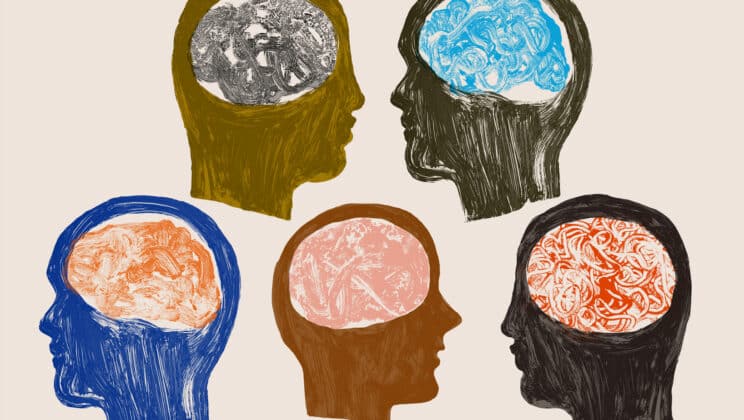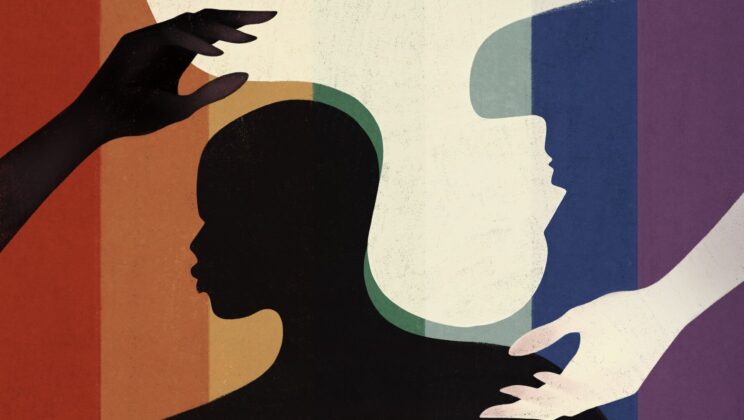Coming Out: How Faith, Culture, and Queerness Can Coexist
June 28, 2021
“I started to notice I was different in some ways when I was quite young,” says Emily* about coming out. A former member of The Church of Jesus Christ of Latter-Day Saints (LDS), Emily–now a graduate student in California–remembers the discomfort and confusion she experienced around her sexual orientation throughout her early teens. “I was never really boy-crazy–actually, I never hit that phase at all. Instead, I’d always try to be around my favorite female classmate. I chalked this up to wanting friendship, but as I got older, when that developed into more concrete sexual feelings, I didn’t have the language for it. I was so repressed that I couldn’t even realize my queerness as a possibility.”
Emily did eventually come out as bisexual when she left the LDS church, and finding a place where she was free to express her queer identity was invaluable: “I felt like, overwhelmingly, people have my back. Even people in power. And I think that makes a huge difference.”
Even so, losing her first spiritual community wasn’t easy. “I grew up in a very chaotic, very unstable family. As a child, the LDS church had provided a safe space for me–they kept my siblings and I clothed and fed. At Christmas they made sure we had gifts.”
Coming out in non-affirming spaces can extremely difficult for queer people, and can negatively impact their mental health. The Trevor Project’s national survey on LGBTQ Youth Mental Health in 2020 reports the following startling statistics:
- 29 percent of LGBTQ youth have experienced homelessness, were kicked out of their living spaces, or have run away
- 48 percent of LGBTQ youth reported self-harming in the last 12 months
- 60 percent of LGBTQ youth who said they had self-harmed in the last year were transgender and nonbinary
- 10 percent of LGBTQ youth said they had been through conversion therapy, and most said they had gone through the experience as minors
According to Priscilla Cheng, a licensed marriage and family therapist, “Integrating faith and Queer identity is rarely easy.” Cheng, who is a genderqueer and Christian licensed therapist, specializes in integrating Queer identity and Christian faith. They also work through religion-related trauma to create affirming community spaces and healing for people. The need for providers like Cheng, who specialize in LGBTQIA+ mental health, is increasingly urgent– and much of that need is connected to the prejudice and intolerance experienced by the LGBTQIA+ population. The American Psychiatric Association (APA), in fact, reports that health disparities among members of the LGBTQ community are linked to stigma and discrimination, with youth in the community being four times as likely to attempt suicide as their cisgender, heterosexual counterparts.
Tips for coming out in a non-affirming space
With these tough realities in mind, coming out can be a complex–though extremely rewarding–process. If you’re considering how and when to come out, Cheng suggests the following:
Keep your values in mind
Which personal values or characteristics are most important to you? Values like honesty, peace, friendliness, independence, achievement, freedom, or equity are examples that can guide you in your decision-making. For example, if you value peace in your relationships, you may not come out as gay to relatives who express hateful attitudes toward gay people. Instead, you might spend time with supportive friends. When deciding when and with whom to come out, it’s important to focus on your values and priorities versus what you think you “should” do or what you’ve been told is “right,” as these are highly personal decisions, according to Cheng.
Consider your safety
Coming out in a non-affirming space can be fraught with difficult consequences. When considering coming out, Cheng advises a temperature check of your communities and relationships. Are they absolutely unsafe and encumbered with risks of losing financial help or support? Is it uncertain if they will accept you and your identity? Or are they supportive and respectful of your choices surrounding your identity?
Emily adds, “I think it’s important to prioritize your safety and your mental health in whatever form that takes. Prioritize getting mentors you trust, not just the first older person that’s queer, because sometimes that can be unsafe. It can be really helpful to have someone you really do see has proven they’re trustworthy and can really help you find community.”
Validate yourself
Coming out can be met with a lot of invalidation. Emily says, “When I first came out to my mother, she suggested that my bisexuality was a phase, which was really invalidating.”
Cheng suggests that the key to combating this particular type of stigma lies in self-validation. They note that “You are allowed to provide yourself grace and affirmation. It’s important to acknowledge your authentic experiences and feelings.” Two statements that helped Cheng in their own journey were: “I am not broken or a mistake” and “I am on a challenging path of identity.”
Build an affirming community
A safe and affirming community provides relationships that celebrate you in your whole self. According to North Carolina State University’s Office for Equity and Diversity, a safe space can be defined both ideologically and physically as “A place or environment in which a person or category of people can feel confident that they will not be exposed to discrimination, criticism, harassment, or any other emotional or physical harm.” Cheng says, “In my personal journey, Q Christian Fellowship has been an affirming online faith community for me. Where can these relationships exist in your life? What does a support network look like for you?”
If you’re considering seeking mental health support, find an experienced and supportive mental health provider
In too many cases, the mental health field has been used to oppress and harm the LGBTQIA+ community through practices like conversion therapy, lobotomies, the characterization of homosexuality and transgender identification as a disorder, and more. With that in mind, it’s essential that your mental health care provider is qualified and trustworthy, and that you feel understood and supported by them.
Here are some sample questions to ask when considering working with a provider:
- What experience do you have treating clients dealing with faith and LGBTQIA+ identity?
- Are you LGBTQIA+ affirming? What does that mean to you in your practice?
- Do you have lived experience as a member of the LGBTQIA+ community? If not, have you gone through any training or worked with clients from this community?
- What treatment approaches do you use in therapy? What would it look like for my situation?
- How will I know if therapy is helping? What can I expect?
Cheng’s tips can be helpful even after someone has come out. While she feels much more supported and understood than she has in past communities, Emily says she is still learning about her queer identity. In continuing her path toward self-discovery, she practices some of the same advice Cheng offers: considering her values and safety, validating herself, building an affirming community, and seeking mental health support from a knowledgeable and specialized therapist. Emily says, “I feel a lot more confident being openly queer. I don’t go so far out of my way to hide it anymore as I did when I was in LDS. But I would also say that I’m still coming out in many ways as I explore my identities, revisit my self-narrative, and rebuild my sense of community.”
Emily’s journey has involved reconciling a different type of spirituality with her queer identity. She says, “I spent a long time trying to find an alternative to the LDS community. And now, while I’ve kind of moved away from religion, I’ve also recognized spirituality is a really important part of who I am, and that no one can necessarily tell me how to be spiritual.” She adds that finding an accepting spiritual community near her graduate program was extremely helpful in guiding her towards that reconciliation. “To have that space,” she says “Exploring spirituality in a queer-identifying, student-led group was huge.”
While coming out in non-affirming spaces or communities can be extremely challenging, for many, it can also free them to live their authentic lives. Cheng’s tips are helpful to keep in mind for people considering when and where to come out.
*Name has been changed to protect privacy.
CONTACT US
If you want help connecting with a therapist, Lyra can assist you. You can get started today if Lyra is offered by your employer. Sign up now.
For employers who want to learn more about how Lyra’s enhanced EAP addresses network adequacy and quality issues,download our whitepaper on quality or get in touch.
And check in frequently here or follow us on Facebook, LinkedIn, and Twitter for more insights into supporting employees’ mental health.
DISCLAIMER
The content of this blog is not intended to be a substitute for professional medical advice, diagnosis, or treatment.
ABOUT PRISCILLA CHENG
Priscilla Cheng, LMFT (they/them) is a genderqueer Christian, a Bay Area native, and a licensed psychotherapist. Their practice, Pride and Grace Counseling, specializes in integrating Queer identity and Christian faith, and working through religious trauma, in order to create affirming spaces in the community and healing for individuals.
ABOUT THE AUTHOR: Mariam Helmy is a content specialist at Lyra Health, where she develops, writes, and plans content for the Lyra blog. Mariam has a background in writing and psychology, and has a Masters degree in educational content from the University of Cambridge.
Explore additional blogs

Mental health at work
6 Strategies to Support Neurodiversity in the Workplace

Mental health tips
How to Parent a Child With ADHD

LGBTQIA+